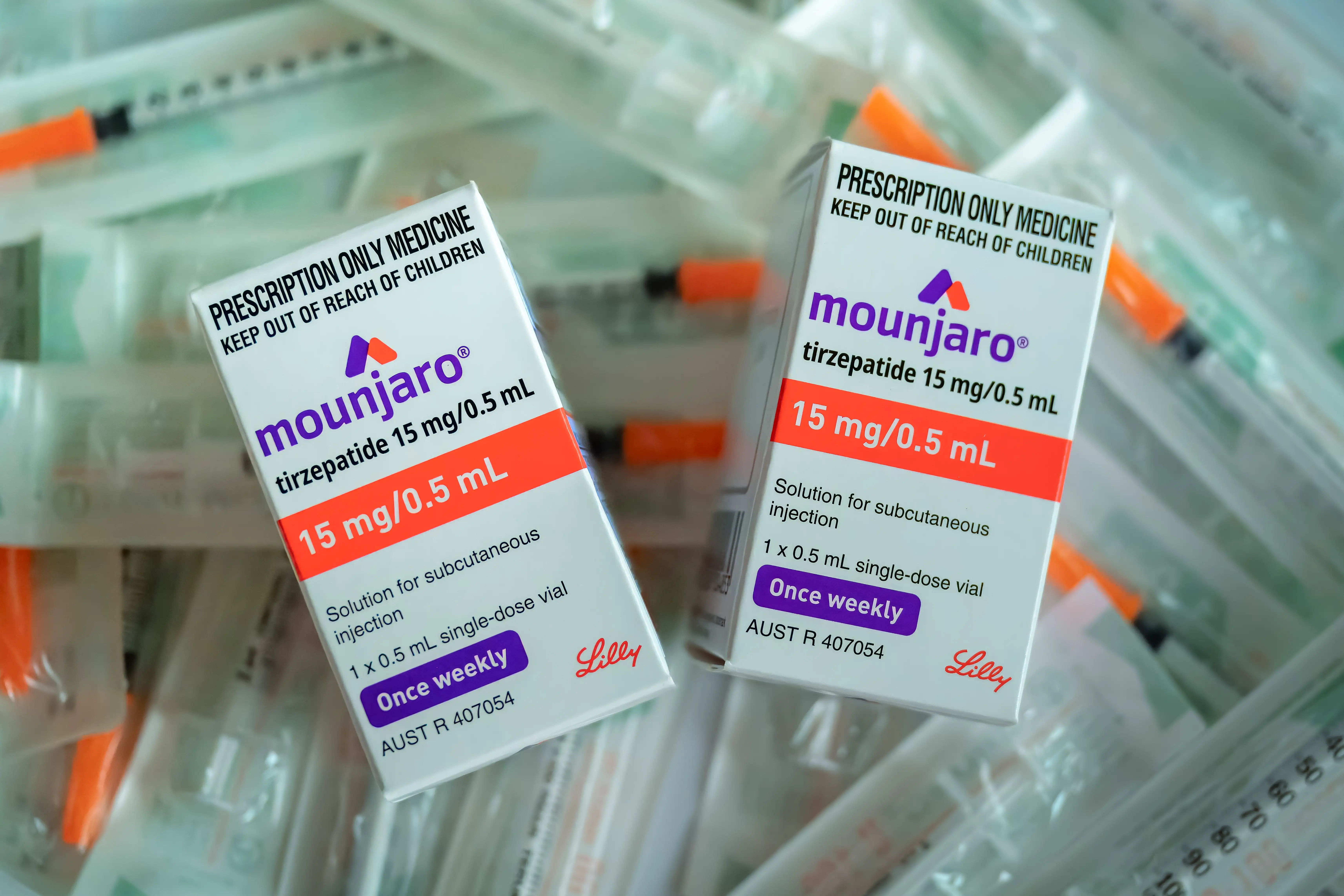
There are pros and cons for weight loss medications like Ozempic

Drugs like Mounjaro and Wegovy have led to a sudden shift in treatment, but also to a lot of questions about how we think about and treat obesity
Published 29 August 2025
‘Ozempic face’. Five years ago, if you’d heard those words you would probably think it referred to an alien species.
But brand names for drugs used for weight loss are suddenly common jargon.

These drugs, which mimic hormones that your small intestine like GLP-1 create a feeling of fullness and were originally used as part of diabetes treatment.
Their new-found uses, prescribed in Australia without government subsidies, are showing a dramatic impact on weight loss.
But this sudden shift in treatment opens up a lot of questions and possibilities about how we think about and treat obesity.
We spoke to three health experts and someone taking these drugs to explore how they contribute to patients’ health and to discuss potential concerns surrounding the sudden surge of interest.

‘Science over shame’
Associate Professor Niloufar Torkamani, endocrinologist and director of weight management services, Austin Health, Faculty of Medicine, Dentistry and Health Sciences
Obesity is a complex, chronic medical condition that requires long-term, evidence-based management.
For too long, it has been viewed primarily through the lens of personal responsibility rather than recognised as a multifactorial disease.
This outdated view has contributed to stigma and discrimination, which remain some of the major barriers for many people living with obesity.
The emergence of GLP-1 receptor agonist medications has transformed the way we now approach obesity management.

Originally developed for diabetes, these drugs are supporting sustained weight loss, improving metabolic health and reducing the risk of serious complications like type 2 diabetes and cardiovascular disease.
They are shifting how we treat obesity. We’re approaching it as we would any other chronic illness – with compassion, clinical rigour and continuity of care.
But access to obesity treatment remains limited for many, and weight bias, both societal and within healthcare systems, continues to hinder progress.
It’s critical that we foster an understanding of obesity as a disease, not a choice.
This includes ongoing education for healthcare providers, public health messaging that emphasises science over shame, and system-wide support to ensure patients can access the therapies they need.
Only by prioritising early and effective medical intervention can we improve someone’s health outcomes but also reduce the broader burden of obesity-related diseases on our healthcare system.

Health & Medicine
Is treating obesity the future of managing type 2 diabetes?
It’s time we align our clinical practices and public narratives with the evidence, treating obesity with the same seriousness and dignity as any other chronic condition.
‘Not silver bullets’
Associate Professor Garron Dodd, neuroscientist, Head of the Metabolic Neuroscience Laboratory, University of Melbourne; CSO and Founder, Gallant Bio
The advent of incretin-based therapies for the treatment of obesity and diabetes is arguably the most transformative advance in modern medicine since antibiotics.
These drugs, typified by compounds like semaglutide (Ozempic) and tirzepatide (Mounjaro), have radically shifted our approach to treating metabolic disease.
For the first time, we have pharmacological tools that can deliver sustained, clinically meaningful weight loss and improve metabolic health in a large proportion of patients.

The implications for public health, healthcare systems and quality of life are unprecedented.
But these drugs are not silver bullets. Like any medicines, incretin-based drugs come with limitations.
There’s a significant number of patients who either do not respond or become intolerant to treatment. Others re-gain weight after stopping, highlighting the biological resistance to weight loss and the challenge of maintaining results long term.
That said, the future is bright.
Labs at the University of Melbourne are developing next-generation therapies, including incretin-independent mechanisms that could work with or as alternatives to GLP-1-based drugs. Critically, this revolution in obesity treatment is a product of publicly funded science.
The origins of incretin biology were uncovered in university laboratories, driven by curiosity and vision, alongside long-term investment in basic research.

Health & Medicine
Why women are more likely to ‘stress eat’
The development of these drugs is a powerful reminder that government-funded science, particularly within academic institutions, is not just an investment in knowledge – it’s how we change the world.
‘Genuinely lifesaving’
Nadine Hansen, CEO TechKnowledgey and patient
In April 2023, I began taking Ozempic to tackle pre-diabetes, oesophageal reflux and severe osteoarthritis in my knees.
I was constantly visiting doctors and a variety of specialists.
The turning point came when a knee surgeon bluntly told me, “It’s no secret that you're morbidly obese.”
It was a confronting experience. I had an angry and frustrated cry. His words stung, but they were true.

It was a brutal realisation that my obesity was at the root of most of my health issues. It’s worth noting that I was also someone who had been on calorie-controlled diets and exercising the whole time with very little success in losing weight and keeping it off.
Something else was at play.
Determined to find a solution, I wanted to find a specialist who would look at me holistically. My search led me to consult an endocrinologist Associate Professor Niloufar Torkamani.
When I started on the medication, I learned that I had to train myself to find out what my body will and won’t tolerate.
At first, it’s trial and error. The results of an error are unpleasant. But it’s safe to say that foods high in sugar and certain fats are not tolerated at all.
Due to supply issues, I switched from Ozempic to Mounjaro in 2024, which I’m currently taking. Both medications have worked for me and I have lost a considerable amount of weight.

Health & Medicine
More than a high BMI, an ‘obese heart’ is a silent risk
While the medication is costly, my husband and I agree it’s essential spending. For me, it’s genuinely lifesaving.
It’s only when obesity is recognised as a disease that we can address its symptoms more effectively and have a meaningful discussion about treatment.
For me, acknowledging this truth has been the first step towards reclaiming my health and happiness.
‘The health economics angle’
Associate Professor Chris Schilling, health economist, Melbourne School of Population and Global Health, University of Melbourne
The health economics of these new drugs is fascinating.
Trials suggest the drugs deliver substantial weight loss, almost on par with bariatric surgery, that can be life changing.

Being overweight or obese is associated with a multitude of negative health outcomes, and the extra healthcare costs over a lifetime are staggering. Sustained weight loss could reduce these costs and save the patient thousands and the healthcare system billions.
But the drugs are expensive, at least currently, and ongoing use is required to maintain weight loss.
University of Melbourne health economists are currently evaluating their cost-effectiveness using complex models that simulate the population into the future. These models allow us to compare the costs of the drugs today with the benefits from the weight loss in the future.
Our initial results, yet to be published, suggest that these drugs are unlikely to be cost-effective for the wider population suffering obesity, simply because the prices are so high.
This is consistent with what other researchers are finding.

Health & Medicine
How Australia is losing the health fight
It means that, from a health economics perspective, it’s unlikely that we can fund these drugs for everyone.
Currently, the government’s Pharmaceutical Benefits Advisory Committee (PBAC) has acted with caution, and limited subsidies to a subset of people with diabetes who meet strict clinical criteria.
We think this is appropriate.
Our recent research on the uptake of these drugs in the US outside of diabetes showed a tripling of usage in four years, at a cost of almost $US6 billion.
If we had the same level of growth here, it’s possible that subsidising these drugs for all people with obesity could cost a substantial chunk of the entire PBAC budget.
So if we can’t fund them for all, who should get access?
From a health economics perspective, we typically take an efficiency lens where we want to get the best bang for buck from our limited health budgets. This means subsidising the drugs for those that will benefit the most.

People with diabetes fit this bill, but we need more research to identify for which other Australians these drugs will be cost effective. At the same time, we need to be negotiating to get lower prices for Australian consumers.
And we need to act fast.
Currently, only those who can afford to pay full price are accessing the drugs for weight loss purposes. With more evidence and lower prices, the PBAC can make these drugs more widely available to those who can’t afford to pay.
You can watch a recording of the panel discussion at Federation Square hosted by the ABC’s Dr Norman Swan in conversation with the article authors.



